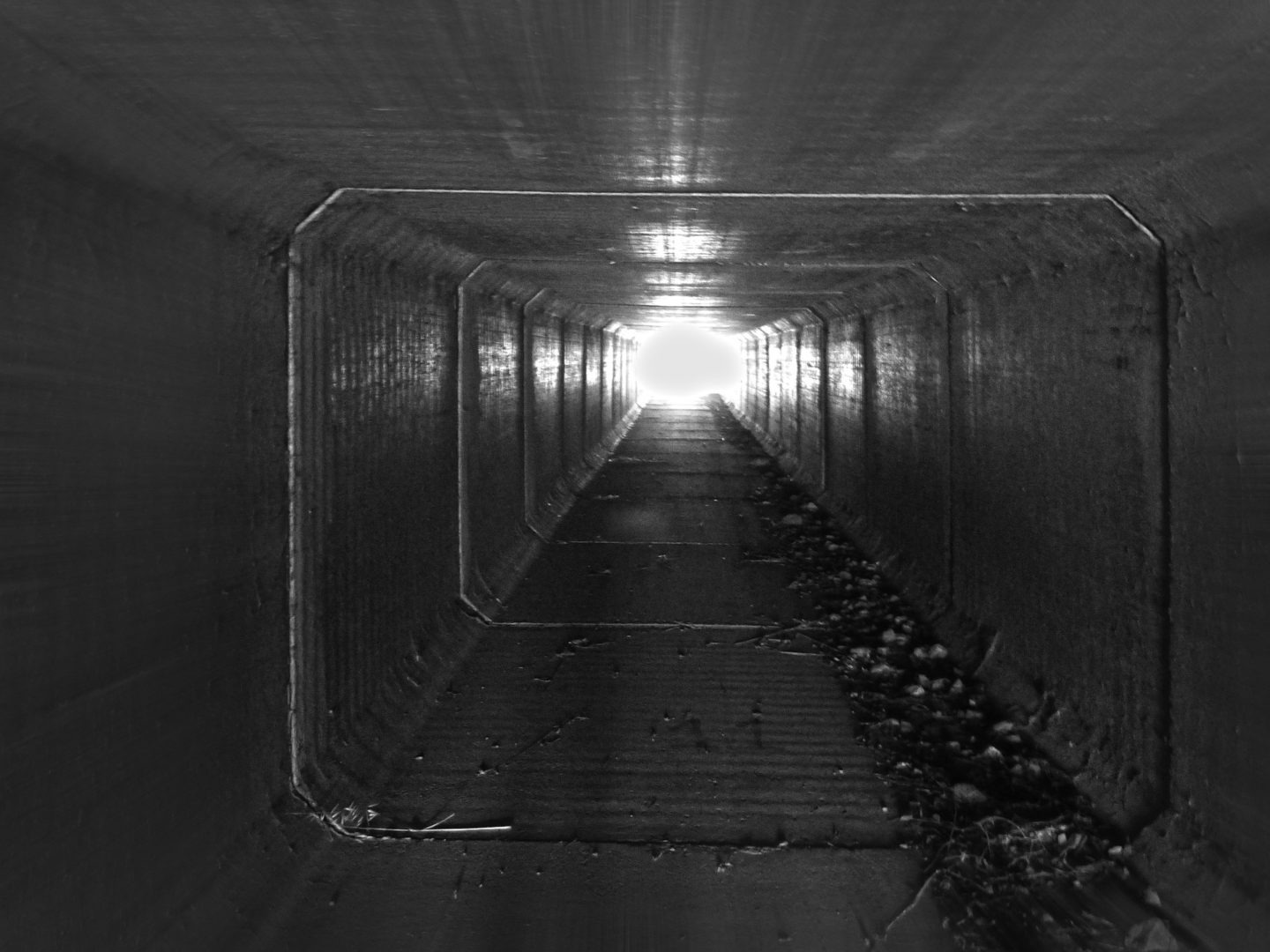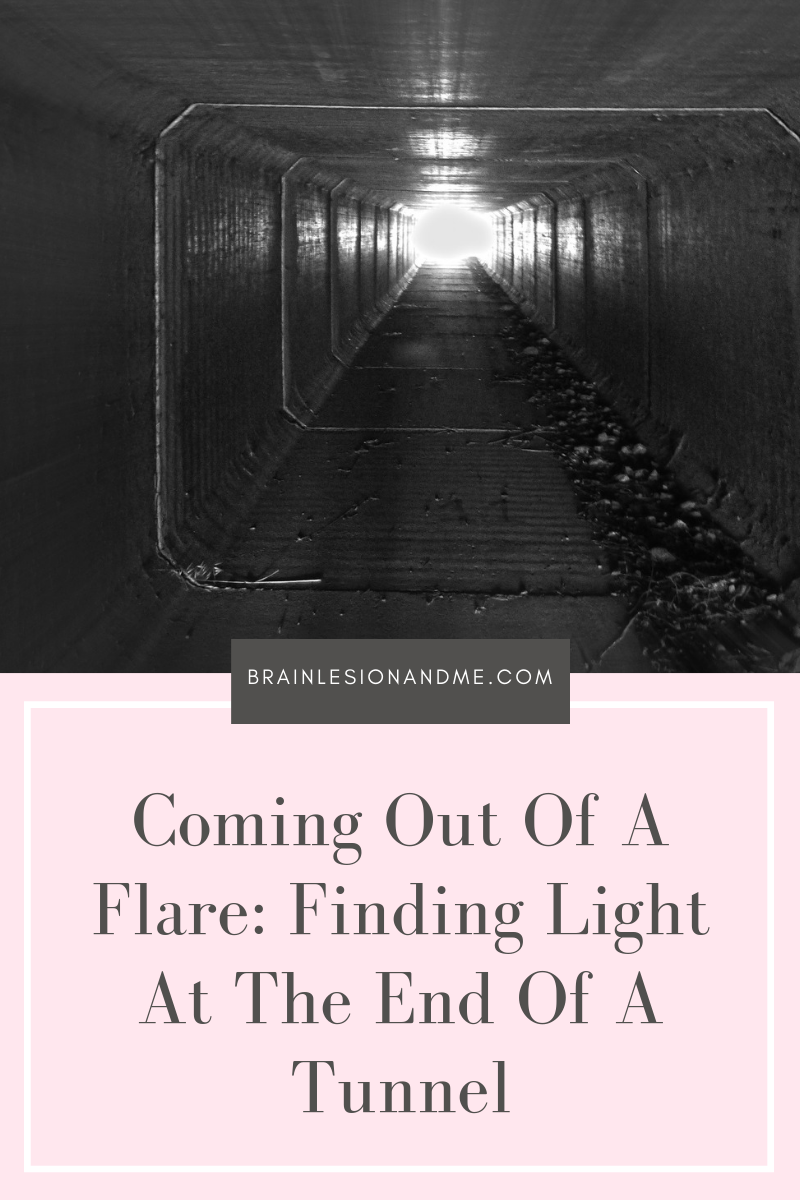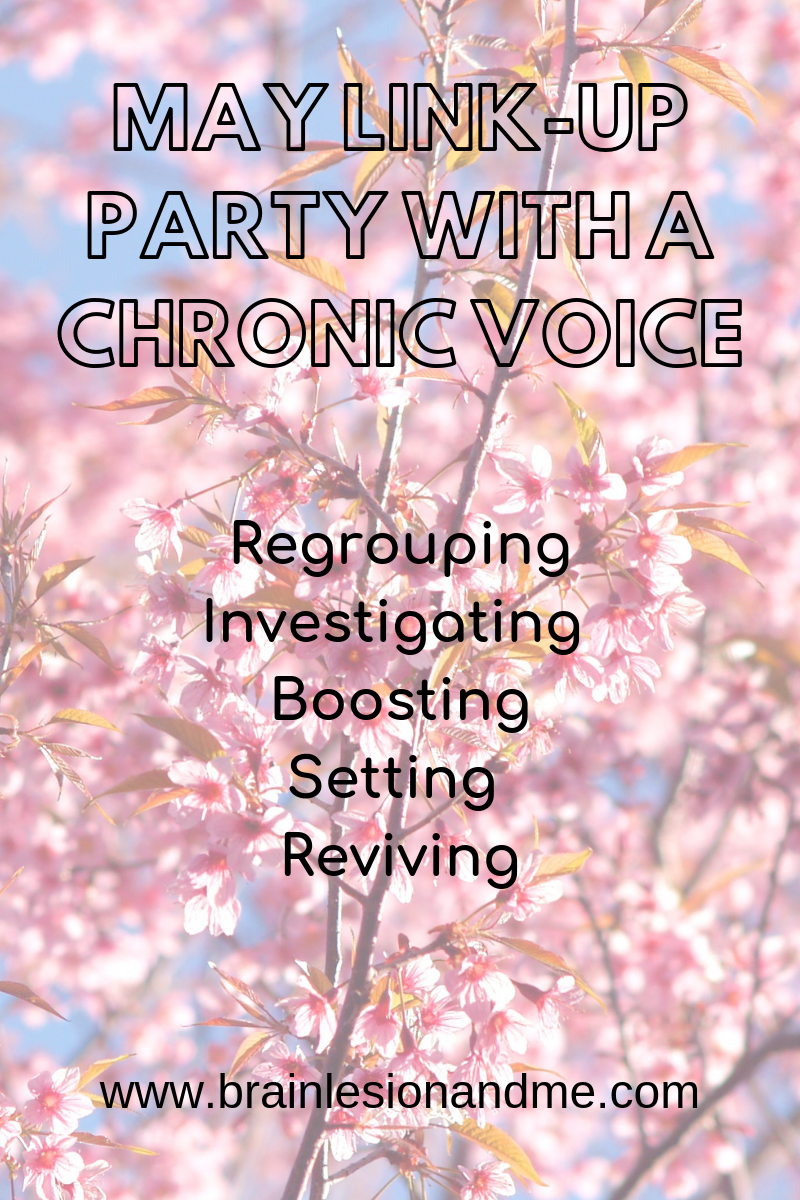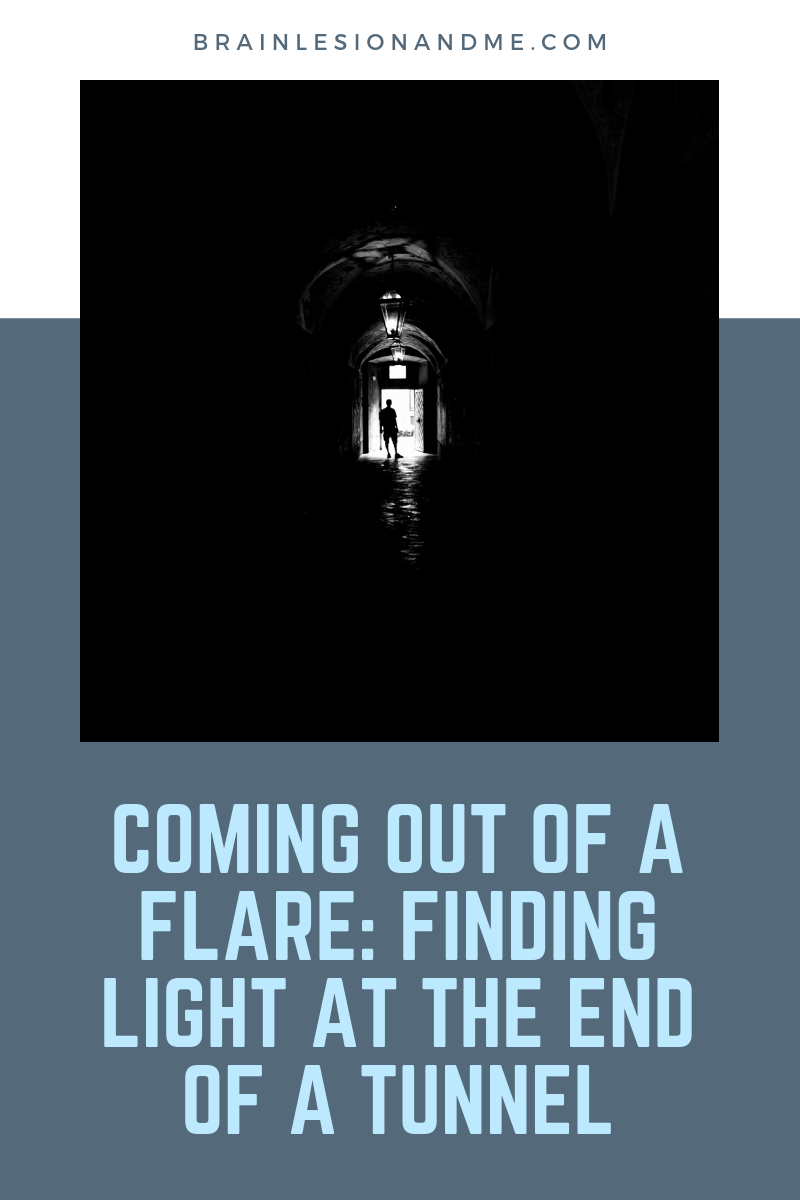Sheryl from A Chronic Voice, as well as sharing her own stories and lessons with chronic illness. Sheryl is an excellent support to other bloggers and writers living with illness and chronic pain. One such way is through monthly link-up parties whereby bloggers and writers share their stories through given prompts. This month, I have decided to use the prompts to look at life after a flare.
Anyone living with a chronic illness has experienced a flare. And so, would agree when I say how difficult and distressing it can be experiencing one. Many fellow bloggers have written posts on what it is to experience a flare. I have even written a series of posts on living through a hellish flare. It can be an extremely dark time, but what happens when the current eruption of disabling symptoms start to dissipate into the ether?

Out of A Flare – Starting to Regroup and Putting the Pieces of a Broken Life Back Together
Experiencing a severe and debilitating flare can make you feel like life is on pause. Energy and strength, everything that usually helps you continue despite persistent symptoms from chronic illness are in scarce supply. As such even getting out of bed or having a shower requires a considerable amount of energy. Days spent rationing the limited power that we do possess. There is no energy to live, only just enough to survive the days ahead.
When coming out of this current flare, we begin to see the light at the end of a dark tunnel. As the light becomes nearer and brighter, we can start regrouping the pieces of our broken lives that illness has destroyed, back together. To start beginning to regroup, putting ourselves back together and allowing ourselves to regain control over symptoms that once had sole authority.

After a flare, there is a need to regroup and regather the tools that had been cast aside, to help us thrive despite illness and its accompanying symptoms. To allow ourselves to retrace our long forgotten steps and to catch-up on the abandoned tasks from before the flare that knocked us down into oblivion.
Out of a Flare – A Need to Investigate and Identify Our New Limits
Every flare is different, and as such, we react differently to each one. And as we come out of a flare, there is a fear of doing ‘too much’ supposing that doing so will exacerbate symptoms, causing another flare.
"Every flare is different, and as such, we react differently to each one. And as we come out of a flare, there is a fear of doing 'too much' supposing that doing so will exacerbate symptoms, causing another flare." Click To TweetThe problem is, however, we no longer know of our new limits. We may now be able to do more before exacerbating symptoms, or it may be less. Our limits and what and how much we are capable of continually shifts. And as we adjust and accustom to our new limits, a flare occurs to restart the process all over again. Therefore, there is a need to investigate our new energy levels and identify our new limits.

No one likes to be, or indeed feel unwell. To be constantly sick and continuously feeling the effects of debilitating symptoms is exceptionally unpleasant. Investigating, therefore, becomes another theme of living with a chronic illness. We are continually investigating ways in which we can improve our symptoms, even just a little. Investigating new measures we can undertake to lessen the severity or even the number of flares. Doing so, would drastically improve our quality of life and able us to experience life.
"Investigating becomes another theme of living with a chronic illness. We need to continually investigate ways in which we can improve our symptoms, even just a little." Click To TweetOut of a Flare – Boosting Self-Care Habits
We may be coming out of a flare, but do not assume that it means we feel better and are suddenly back to our ‘normal.’ Recovering from a flare is a slow process. A process that does not just happen overnight. Many may assume that when recovering from a flare we need less self-care.
"If we don't boost the need for self-care we run the risk of exacerbating troublesome and unruly symptoms, and the risk of causing another flare." Click To TweetI, however, would argue that we’re in fact in need of more self-care. If we do not take the necessary steps to look after ourselves, if we don’t, we run the risk of exacerbating troublesome and unruly symptoms. Taking the time for self-care activities that help boost physical and mental health is necessary to assist us to recover, and help stave off another deterioration.
"Taking the time for self-care activities that help boost physical and mental health is necessary to assist us in recovering, and helping stave off another deterioration." Click To TweetOut of a Flare… Time to Explore New Settings
When I am in the midst of a flare, I am unable to cope with anything new and unfamiliar. Not knowing when symptoms are suddenly going to worsen, I crave the reassurance and security of a familiar and comforting setting.

Coming out of a flare, I, however, start to crave and feel ready for more adventure. I am ready and feel more confident to encounter new settings. Living through a flare, therefore, feels very much like hibernation. A need to hunker down for comfort and to survive the current eruption of symptoms. Only as the threat diminishes, we then feel more prepared to leave the safe environment we spent during the duration of the episode. We now crave adventure, new settings to spend time in as long as we feel well enough to do so.
"Living through a flare feels very much like hibernation — a need to hunker to survive the current eruption of symptoms. Only when the threat diminishes, we feel ready and more prepared to face new and unfamiliar settings." Click To TweetOut of a Flare – A Time for Reviving Life
As the flare passes, and we feel out of the danger zone for another one, we can finally start reviving our life. Reviving our love for the activities that fell by the wayside as we lay incapacitated by ruling symptoms.
"As a flare passes, and we feel out of the danger zone for another one, we can finally start reviving our lives once again. Reviving our love for the activities that fell by the wayside as we lay incapacitated by unruly symptoms." Click To TweetBooks and reading have always been a passion of mine, but during a flare, I have been unable to do so. But, as I am feeling stronger, the fatigue no longer causing double vision I can once again revive my enjoyment of reading.

During the last month, I have already finished three books, and nearly half-way through the fourth. I am enjoying finishing my days, tucked into bed and losing myself in the fictional world created by the words of the author of my current choice, being immersed into another world, of another life, distracting me from the constant troubling symptoms of a neurological disorder.



12 Comments
I recently came out of a long flare (I now dub my “winter flare”) and resonated with a lot of your points, especially the line, “Recovering from a flare is a slow process.” It is indeed. Plus there’s so much anxiety, uneasy, and apprehension in be able to do things again after a big, long flare because of the worry those things may plummet us back to the depths of what we just got out of. Thanks for sharing your experience!
Thank you so much, Melanie, for your kind words and sharing your story. Yes, I agree that there is a lot of anxiety, unease, and apprehension about doing anything after such a debilitating flare, and the worry that doing so will result right back to square one again – like living in a permanent game of snakes and ladders!
Hope you are as well as possible
Rhiann x
I know that people with my condition talk about flares, but I’ve never really seen it myself. I have days when maybe I can do more than others and I have days when I can do nothing at all. But I never seem to have days when I actually feel ok. I guess I could say my ‘flare’ is currently on it’s fourth year! I can resonate with some of your post though, I do look forward to piecing my life back together and doing normal things feel so good. I know no matter what I do I’m going to pay for it, but you can’t let it stop you and you always need to be looking for that light at the end of the tunnel. x
Thank you Anne!
All the best
Rhiann x
I agree totally with this: “Recovering from a flare is a slow process.” I was in a fibromyalgia flare from late December till the end of April. As I increase activities, I really have to pay attention to my body’s signals.
Thank you, Kathy. I hope you are as well and continue to be as well as possible.
Rhiann x
Hi Rhiann, thanks for joining us once more. This was lovely to read; whilst I’m not exactly having a chronic illness flare at the moment, I’m in the midst of recovering from ‘normal people’ illnesses, which isn’t any more fun, either! 😉 I hope to ‘revive’ out of this comatose-like year soon haha. Sending love.
Thank you, Sheryl. I must admit at first I had no idea how to use the prompts from this month, and really had to think hard on what to write, as I hope I did them justice in the end! Thank you for giving us all the continued inspiration and encouragement for writing and sharing our stories.
Rhiann x
Very good use of the prompts & I think you’ve described a flare incredibly well. When you wrote “living through a flare, therefore, feels very much like hibernation”, I realised that’s how I see it as well, and then having new settings, making adjustments to deal with it and ‘ride it out’, so to speak. You so beautifully give a positive uplifting to this post when covering the aspect of reviving life afterwards. Brilliantly written, a spot-on post, Rhiann!
You described coming out of a flare perfectly! I totally resonate with needing to investigate our new energy levels and identify our new limits.
I always feel like a baby learning to walk during those times. I take a step and try something. Sometimes it goes well and I take another step. Sometimes it goes bad and I plop down! Lol.
Visiting from A Chronic Voice link up. Thanks for sharing!
Thank you so much, yes, I am often the same – trying my feet and balance when coming out of a flare, often times, like you that I end up on my backside as it doesn’t go as well as I thought it would! Often need to laugh about it as would only cry instead!
All the best
Rhiann x
Thank you so much for your lovely words! You don’t know how much they mean and the encouragement they give when you don’t know if you have the ability to carry on!
Regards
Rhiann xx